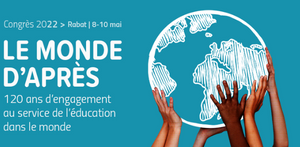Rumor has it that I went to Marrakech last week to catch some rays, leaving the rest of you here in the rain and cold of this endless New York winter. The rumors are greatly exaggerated!
As I mentioned last Friday, I went to my first conference in more than two years, to meet my colleagues from the MLF, which is celebrating its 120th anniversary this year. More than 500 of us came together at the International University of Rabat, where there were 30+ seminars and 40+ workshops on the agenda, all centered on the theme “The World Afterward.”
The world afterward is of course the one borne of a pandemic whose consequences we are still struggling to comprehend, but which has, for now, and possibly for the long term, emptied certain schools of their staff and students. The world afterward also describes a shift in the objectives of education today and those of tomorrow. It strikes at the essence of schools, whose very raison d’être is to equip children with the tools they will need as adults in the world that they will inherit.
Fixing these objectives—and thereby predicting which types of knowledge will be essential in the future—is an eminently political question that each country approaches in keeping with its own particular context. I had the pleasure of spending time with colleagues from Lebanon, Palestine, and Togo; the issues at stake for them are far removed from mine or from those of colleagues based in Spain or Egypt.
We are nonetheless motivated by the same concerns and struck by the same doubts: Is our role as heads of school to ensure our students are future employable? Shouldn’t we be ensuring they are happy and thriving on a personal rather than a professional level? Are the two mutually exclusive? Should we renounce knowledge in favor of life skills? And how do we go about defining soft or interpersonal skills? How do we teach resilience, for instance, to elementary students? And isn’t resilience itself an inherently political normative value?
It had been a long time since I found myself sitting in a lecture hall, surrounded by inspiring colleagues, listening to top-class speakers. It had been a very long time since I experienced the strength of collective intelligence in action, witnessed the possibilities it creates, the gaps it opens, and the opportunities that flow from them. I left Rabat feeling more convinced of some of my beliefs, and more open to others. I left feeling confident that The École, whose excellent reputation precedes it throughout the MLF network, is headed in the right direction and asking the right questions.
I returned reinvigorated from my trip, as though I had in fact gone to Marrakech for a few days to catch some rays.


